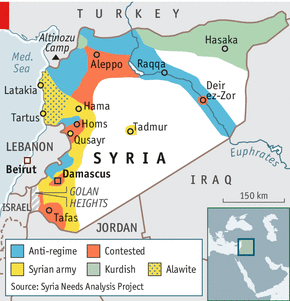Every country has a stake in the conflict one way or another. But that won’t stop the bitter war of attrition from grinding on.
The old joke used to go like this:
“Question: What is globalization?
Answer: Princess Diana’s death.
An English princess with an Egyptian boyfriend crashes in a French tunnel, in a German car with a Dutch engine, driven by a Belgian who was drunk on Scottish whiskey;
followed closely by Italian paparazzi on Japanese motorcycles;
treated by an American doctor, using Brazilian medicines.”
These days, it could easily be something like this. But no one’s laughing now…
Question: What is globalization?
Answer: The Syrian civil war.
Syrian protesters, emulating the success of the Arab Spring in countries like Tunisia and Egypt, rise up in early 2011 against an authoritarian regime long supported by Iran.
Over the course of two years, what started out as mass demonstrations for democratic change descends into an increasingly bitter civil war, with the odds swinging slightly in the regime’s favor over recent weeks. The country disintegrates along sectarian lines, leading to the emergence of self-governing territories (i.e. the Kurds in the northeast of the country).
The rebels soon find support from regional powerbrokers Saudi Arabia and Qatar, with further weapons coming from Libya. Yugoslav-made weapons are allegedly smuggled in from the border with Jordan.
The regime’s crackdown on dissenters turns increasingly brutal. Evidence points to the use of sarin nerve gas against the civilian population, a chemical weapon developed by German scientists prior to World War II (and notoriously deployed by the Japanese terrorist group Aum Shinrikyo in its attacks on the Tokyo subway in 1995).
Neighboring Lebanon allegedly sends thousands of Hezbollah fighters (Hungarian mercenaries are also said to be involved in the war...), threatening a spill-over of violence in the region.
Turkey almost becomes militarily embroiled in the conflict after it blames Syrian intelligence agencies for multiple car bombings in May in a town near their shared border.
Israel steps up the anti-Assad rhetoric and even launches air strikes against military installations near Damascus in spring 2013, partly to avoid the Palestinian Hamas from possibly obtaining “game-changing” weapons.
A key question is whether the newly elected president will change Iran’s foreign policy vis-à-vis Syria, while the Shia-dominated government in Iraq (officially) remains on the sidelines.
The death toll of the conflict reaches 90,000-100,000 casualties, and the violence prompts a mass exodus of refugees to Turkey, Iraq, Lebanon and Jordan.
On the ground, the dynamic among rebel groups shifts in favor of more extreme outfits. The most prominent group, the Islamist Jabhat al-Nusra (JN), pledges allegiance to al-Qaida, a global jihadist organization originally founded in Afghanistan.
Will Syria ever be a single country again?
The increasingly sectarian and bitter civil war in Syria has clearly become a regional proxy conflict, with the military odds swinging slightly in the Assad regime’s favor over the past weeks. But this swing also resulted in more willingness from Western countries to support the regime’s opponents.
A war of attrition looks set to continue as a near-term international diplomatic solution seems unlikely. It is difficult to see the regime achieving lasting control of the entire country, but the same can be said of the fragmented opposition as well. The ongoing dissolution of the country into several self-governing territories will make uniting the country after a (now very distant) peace deal yet more difficult.
Syria: A patchwork of violence. Source: The Economist
Meanwhile, the main political opposition front, the Syrian National Coalition, remains fragmented along ideological lines, though it slowly gains diplomatic traction abroad. Luxembourg, Australia and Malta are among the latest countries to recognize it as the sole legitimate representative of the Syrian people.
Russia and China veto any UN resolution condemning the violence or authorizing international military action.
The political deadlock at the recent G8 summit held in Northern Ireland, which also included Italy and Canada, suggests a peace conference heralded for July in Switzerland is a fading hope.
The expiry of an EU embargo on weapons sales to Syria may open the way for the United Kingdom and France to support rebel groups, while the United States announces plans to provide them with small arms.
Syria’s economy descends into chaos: real GDP decreased by almost 19% last year, and the Economist Intelligence Unit forecasts a further contraction of at least 7% in 2013. The country’s oil production falls from 385 mbpd prior to the crisis to just around 20 mbpd in May.
With no diplomatic solution in sight, it seems the war of attrition will continue to grind on in Syria. And – if the events currently unfolding in Egypt are any indication – the outcome even after a ceasefire would be very hard to predict…
A bejegyzés trackback címe:
Kommentek:
A hozzászólások a vonatkozó jogszabályok értelmében felhasználói tartalomnak minősülnek, értük a szolgáltatás technikai üzemeltetője semmilyen felelősséget nem vállal, azokat nem ellenőrzi. Kifogás esetén forduljon a blog szerkesztőjéhez. Részletek a Felhasználási feltételekben és az adatvédelmi tájékoztatóban.





